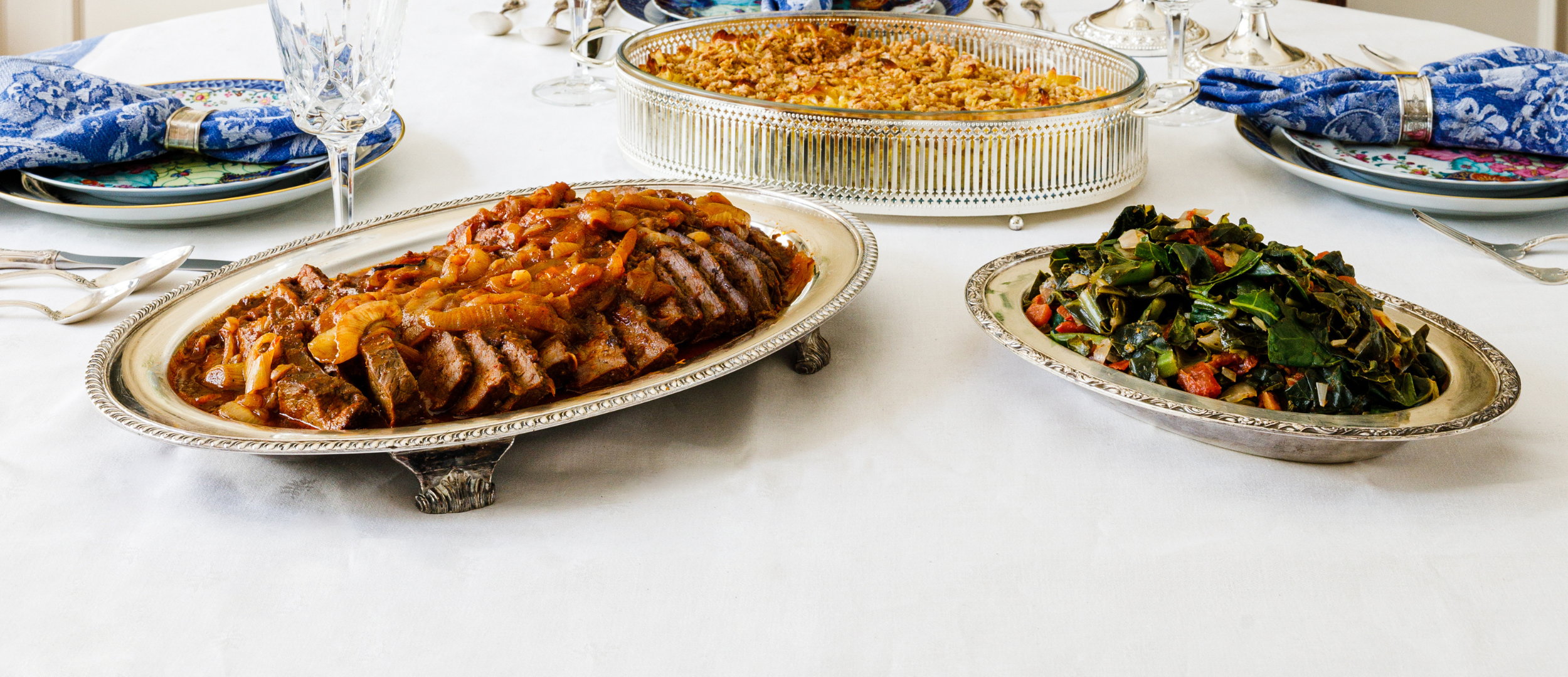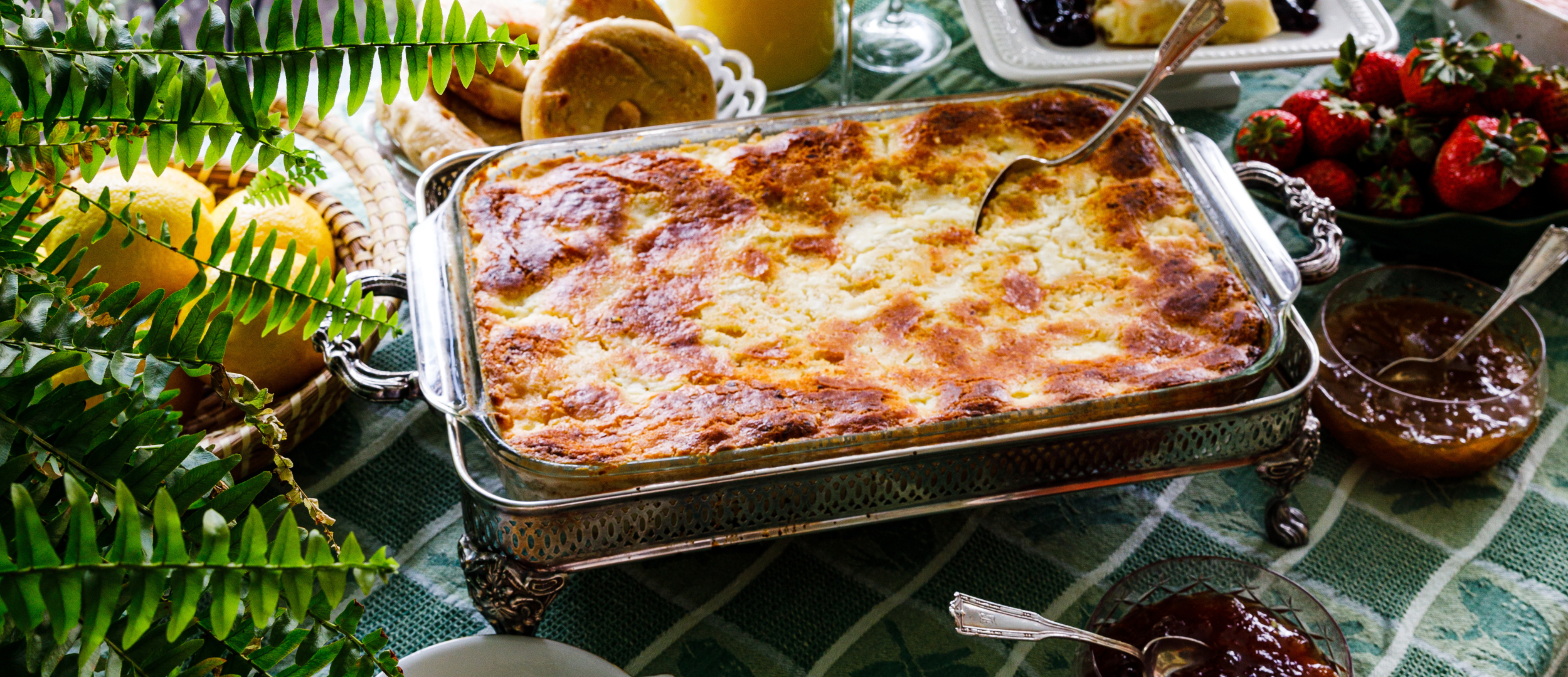
About Kugels & Collards
Kugels and Collards® explores South Carolina’s Jewish history through the lens of food and memory. What began as a blog in 2017 to highlight a lively collection of South Carolina Jewish stories and special family recipes was released as a book on August 29, 2023. In Kugels and Collards, authors Rachel Barnett and Lyssa Harvey explore the food history, traditions, and memories of Jews in South Carolina, building on the blog of the same title.
Kugels & Collards is a project of the Columbia Jewish Heritage Initiative, sponsored by
Jewish Historical Society of South Carolina and Historic Columbia.
Why Kugels & Collards?
From a Lithuanian kugel recipe that made its way to South Carolina, to flanken soup cooked for carnival workers at the South Carolina State Fair, to the southern fried chicken that graced Shabbat meals, tales of food and family fill the pages of Kugels & Collards. A collection of essays and recipes from families who arrived in Charleston in 1791 to today, this book is a poignant—and delicious—compendium of South Carolina Jewish life, from the Lowcountry to the Upstate, revealed through the voices of its community. Food is a lens on the South Carolina Jewish experience.
We have learned that food provokes strong memories and also uncovers little known histories and brings forth voices silenced in the past. Delicious aromas, the taste of a special spice, a treasured china pattern used for a holiday dinner—all can elicit feelings, take us back to a particular time and place, and define a moment in time. Kugels & Collards is not a typical cookbook; rather it is a collection of essays and family recipes from 69 contributors—Jewish and non-Jewish, White and Black, women and men—whose culinary memories are firmly rooted in the Palmetto State. Sabbath dinner brisket and kugel, chopped liver variations, Thanksgiving corn pie and collards, and heirloom pound cakes made for special occasions are examples of what awaits.
Kugels & Collards was born out of our interest in the merging of southern and Jewish elements in our foodways in Jewish South Carolina. Our hope is through recipes and memories we can collect, preserve, and share this special history with our readers.
Project Partners
Historic Columbia, in partnership with the College of Charleston’s Jewish Heritage Collection, the Jewish Community Center and Columbia Jewish Federation, the Jewish Historical Society of South Carolina and the Richland County Library, established the Columbia Jewish Heritage Initiative in 2014 - a multi-discipline project, which documents, celebrates, and increases awareness of local Jewish history, heritage, and culture.
The Blog
Kugels & Collards has been collecting South Carolina Jewish family stories and recipes since 2017. Visit our blog to read the recipes and memories we’ve collected and preserved.
The Book
What began as a blog is now a book published by University of South Carolina Press. Grab your copy of Kugels and Collards: Stories of Faith, Family, and Tradition today!
About the Authors
Rachel Gordin Barnett and Lyssa Kligman Harvey have an interest in all things southern, Jewish, and historical, including foodways. Native South Carolinians, Rachel hails from small-town Summerton, SC, and Lyssa from Columbia, SC. They live in Columbia and have been instrumental in preserving Jewish history across the state. Founding members of the Historic Columbia Jewish Heritage Initiative, they created the Kugels & Collards blog to preserve and share Columbia’s Jewish history by collecting food stories, recipes, and photographs in a digital venue.
Rachel is a past president and current executive director of the Jewish Historical Society of South Carolina (JHSSC). Lyssa is a teacher, therapist and artist. Her life’s work has been dedicated to helping children and impacting her community by creating the Columbia Holocaust Education Commission, the Jewish Cultural Arts, and serving on arts and environmental boards.

“We ate like our Southern neighbors but with a few notable exceptions…”
--Rhetta Mendelsohn (Originally from Orangeburg)






